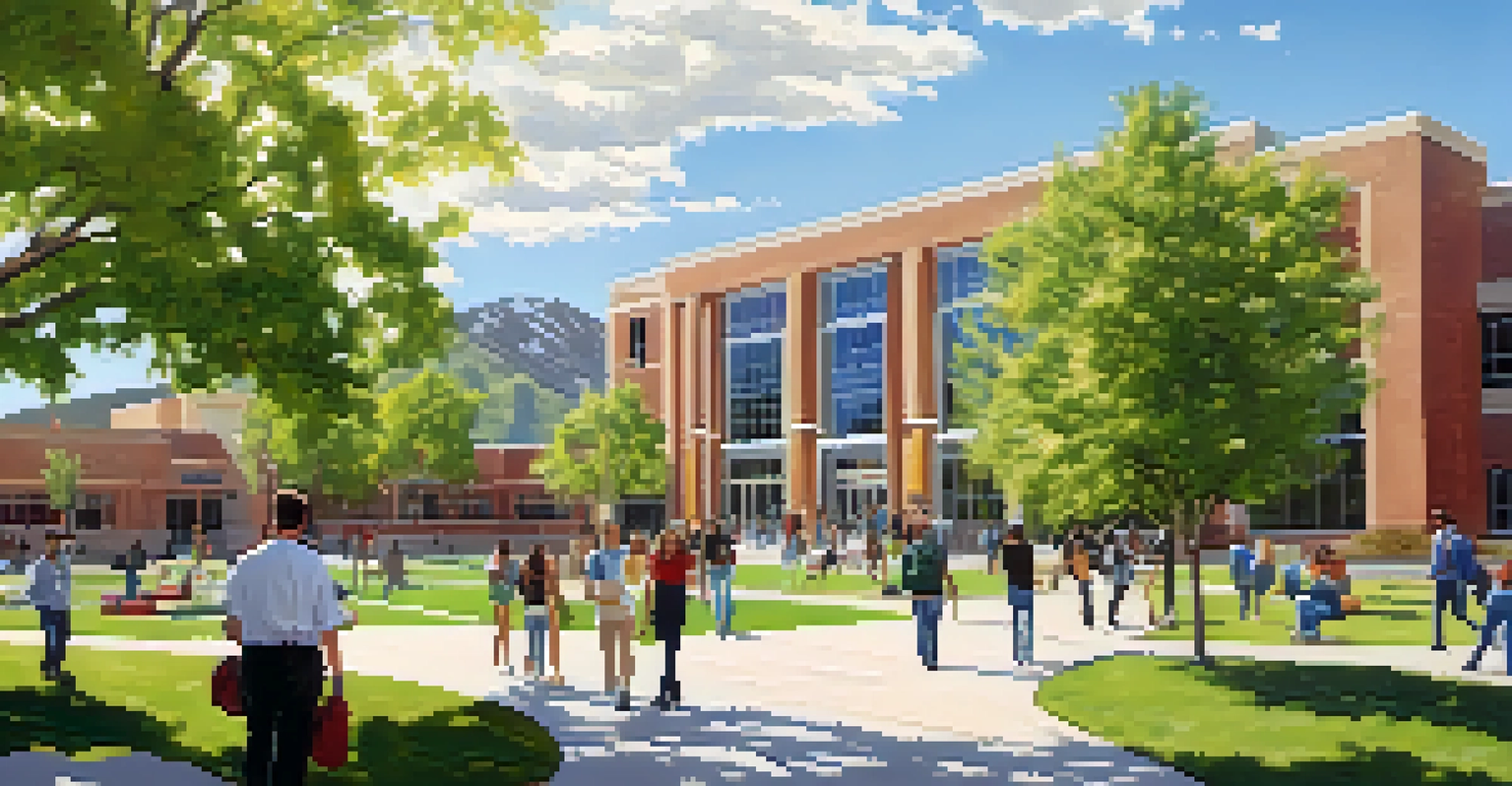Utah's Community Colleges: Pathways to Workforce Readiness

Understanding the Role of Community Colleges in Utah
Community colleges in Utah serve as vital institutions that bridge the gap between high school and the workforce. They offer a range of programs designed to equip students with practical skills and knowledge that align with industry needs. By focusing on hands-on training and real-world applications, these colleges play a crucial role in preparing the future workforce of Utah.
Education is the most powerful weapon which you can use to change the world.
These colleges are more than just educational institutions; they are community hubs that support local economies. They provide affordable education options that cater to a diverse student population, from recent high school graduates to working adults looking to upskill. This accessibility makes them a beacon of opportunity for many who might otherwise struggle to pursue higher education.
Moreover, Utah's community colleges emphasize collaboration with local businesses, ensuring that their curricula stay relevant and responsive to market demands. By doing so, they help students not just learn, but thrive in their chosen fields, creating a robust pipeline of skilled workers ready to enter the job market.
The Variety of Programs Offered by Community Colleges
Utah's community colleges offer a wide array of programs that cater to numerous industries, including healthcare, technology, and skilled trades. For instance, students can pursue certificates or associate degrees in nursing, computer science, or automotive technology, all of which are in high demand. This diverse selection enables students to find a pathway that aligns with their interests and career goals.

Many programs are designed to be flexible, accommodating the schedules of working students. Evening and online classes allow individuals to balance education with personal and professional responsibilities. This flexibility is crucial in today’s fast-paced world, where many are juggling multiple commitments.
Community Colleges as Economic Hubs
Utah's community colleges provide affordable education and support local economies by bridging the gap between high school and the workforce.
Additionally, community colleges often partner with local employers to develop specialized training programs. These collaborations ensure that students receive relevant skills that are immediately applicable in the workplace, enhancing their employability and readiness for the job market.
Financial Support and Accessibility for Students
One of the significant advantages of attending a community college in Utah is the affordability of tuition. Compared to traditional four-year universities, community colleges provide a more economical option for students seeking higher education without incurring substantial debt. This financial accessibility opens doors for many individuals who might feel priced out of the college experience.
The future belongs to those who believe in the beauty of their dreams.
Moreover, various financial aid options, including scholarships, grants, and work-study programs, are available to help students manage their educational expenses. Community colleges work diligently to connect students with resources that can alleviate financial burdens, ensuring that more individuals can pursue their academic and career aspirations.
For many students, especially those from underrepresented backgrounds, these financial supports can make a world of difference. With the right resources, students can focus on their studies and career goals instead of worrying about how to pay for their education.
Real-World Experience: Internships and Job Placement
Community colleges in Utah prioritize real-world experience as a critical component of their educational offerings. Many programs incorporate internships and co-op opportunities, allowing students to gain hands-on experience in their fields before graduating. This practical exposure not only enhances learning but also builds confidence and professional networks.
Job placement services are another vital resource provided by these colleges. Career counselors assist students in preparing resumes, practicing interview skills, and connecting with potential employers. This support helps bridge the gap between education and employment, making the transition smoother for graduates.
Flexible Programs for Diverse Needs
With a wide range of flexible programs, community colleges cater to various industries, allowing students to balance education with work and personal life.
Through these initiatives, community colleges empower students to step into the workforce with a competitive edge. By blending academic knowledge with practical experience, students are better equipped to meet the demands of their chosen careers.
Community Engagement and Lifelong Learning Opportunities
Beyond degree programs, Utah's community colleges foster a spirit of community engagement and lifelong learning. They often host workshops, seminars, and events that encourage local residents to continue their education, regardless of age. This commitment to lifelong learning helps cultivate a well-informed and skilled populace.
These colleges also play a crucial role in bringing communities together. By offering programs that reflect the interests and needs of local residents, they create inclusive environments where individuals can connect and collaborate. This sense of community enhances the educational experience and fosters strong ties among residents.
In essence, community colleges serve as a foundation for personal and professional growth, encouraging everyone to pursue their passions and interests. This focus on lifelong learning not only benefits individuals but also strengthens the community as a whole.
The Impact of Technology on Education and Workforce Training
Technology plays an increasingly significant role in education, and Utah's community colleges are no exception. Many institutions leverage online learning platforms and digital resources to enhance their educational offerings. This integration of technology not only makes learning more accessible but also prepares students for the tech-savvy workplace.
In addition to online classes, community colleges often incorporate cutting-edge technology into their curricula. For example, programs in fields like healthcare and engineering utilize simulation software and virtual labs to give students a taste of real-world challenges they may face in their careers. This hands-on approach helps students develop essential skills that are highly sought after by employers.
Real-World Experience for Students
Community colleges emphasize internships and job placement services to equip students with practical experience, enhancing their employability.
As technology continues to evolve, community colleges remain committed to adapting their programs to meet changing industry demands. This forward-thinking mindset ensures that students are well-prepared for the future workforce, regardless of how technology shapes their chosen fields.
Success Stories: Alumni Making a Difference
Many alumni of Utah's community colleges have gone on to achieve remarkable success in their careers, showcasing the effectiveness of these institutions. For instance, graduates have started their own businesses, excelled in healthcare roles, or taken on leadership positions in technology firms. Their achievements serve as inspiring examples for current and prospective students.
These success stories highlight the potential of community colleges to transform lives. Students who once faced barriers to education have found pathways to fulfilling careers through the support and training provided by these institutions. Each success story reinforces the value of community colleges in fostering economic mobility and personal growth.

By sharing these narratives, community colleges demonstrate their impact not just on individual students, but on the community at large. As more success stories emerge, they encourage future students to consider the opportunities available and the bright futures that await them.